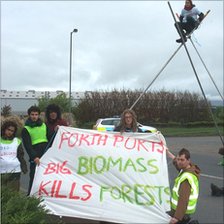
Four people have been arrested in a protest against a proposed biomass power station at Grangemouth docks.
Twenty protesters from Action Against Agrofuels blocked both the access roads to the port, but police said South Shore Road had now been reopened.
The group said the wood-burning power station would threaten forests and worsen climate change.
Forth Energy has said it would use sustainably sourced wood that was a by-product of the timber industry.
The partnership with Forth Ports and Scottish and Southern Energy wants to create four plants in Scotland at Dundee, Rosyth, Grangemouth and Leith.
Central Scotland Police said the activists had been arrested for causing an obstruction at South Shore Road.
‘Necessary action’
Some of the demonstrators locked themselves to scaffolding tripods in the road to block the entrances to the port.
Protester Johnny Agnew, from Glasgow, said: “Vast renewable energy subsidies, paid through all our fuel bills, are being offered for big biomass, which causes more climate change, more deforestation and more pollution. We are effectively subsidising ecocide.”
The group said there was “nothing sustainable” about creating new demand for wood and that the plant would lead to health problems because of air pollution.

Burning ‘any’ biomass adds to atmospheric CO2 levels – it cannot reduce them.
Cutting and burning forests (or for that matter burning any biomass) has the immediate impact of increasing CO2 levels and de-sequestering carbon already captured. Coal is just sequestered carbon that came from ‘not burning’ biomass. Aren’t we trying to sequester all the carbon possible at this point?
How can the proponents of biomass electricity claim that the CO2 from their smokestacks is food for plants, so that biomass can be designated ‘carbon neutral’, and then say CO2 from burning gas and coal is pollution and accelerates global warming? A completely illogical position.
Emissions from burning biomass should be compared to emissions from truly clean and renewable sources of energy such as solar, wind, and marine.
The Scottish Government would do well to ‘just recommend not burning things.’ I don’t think it serves the interests of the major stakeholders, the citizens, when any of us ‘pussy foot’ around the biomass burning issue. Burning biomass, fossil or otherwise, got us into this mess and burning more will only prolong or worsen the CO2 elevation that has acidified the oceans and accentuated global warming/weather change. If Forth Energy do bolt on a heat recovery system (i.e. CHP) to Grangemouth, Leith etc, it will only reduce energy wastage – they still plan to burn the same number of trees every year.
At least the Committee on Climate Change has seen through big biomass. It said in its recent report on renewable energy:
“Given sustainability concerns and demands from other sectors we assume no new investment in biomass in the power sector beyond 2020.”
When cheap supplies of wood from existing forests have been consumed, the big biomass industry will have to rely on new plantations, using species like fast growing pine and eucalyptus. Known as “green deserts”, these monocultures are already supplying the paper and pulp industries and causing conflicts over land and water in the global South.
It’s been calculated that the entire land area of Scotland would need to be covered in Miscanthus to feed the four power stations proposed by Forth Energy. Would we accept that? Why should we assume that it’s OK to impose that sort of monoculture and land grabbing on other countries?
there will always be extreme ideas and actions on areas to do with energy sources – for both sides of the argument. Surely the right approach is to obtain a balance; to include different energy solutions in a portfolio of varied energy sources.